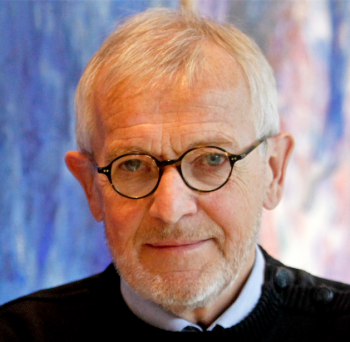
UW–Madison physics professor Francis Halzen has been named a Vilas Research Professor. Created “for the advancement of learning,” Vilas Research Professorships are granted to faculty with proven research ability and unusual qualifications and promise. The recipients of the award have contributed significantly to the research mission of the university and are recognized both nationally and internationally.
Halzen, the Gregory Breit and Hilldale Professor of Physics, joined the UW–Madison faculty in 1972. He has made pioneering contributions to particle physics and neutrino astrophysics, and he continues to be the driving force of the international IceCube Collaboration.
Early in his career, Halzen cofounded the internationally recognized phenomenology research institute in the UW–Madison Department of Physics to promote research at the interface of theory and experiment in particle physics. This institute is recognized for this research and for its leadership in the training of postdocs and graduate students in particle physics phenomenology.
The IceCube Neutrino Observatory is the culmination of an idea first conceived in the 1960s, and one in which Halzen has played an integral role in its design, implementation, and data acquisition and analysis for the past three decades. After initial experiments confirmed that the Antarctic ice was ultratransparent and established the observation of atmospheric neutrinos, IceCube was ready to become a reality. From 2004 to 2011, the South Pole observatory was constructed — the largest project ever assigned to a university and one led by Halzen.
After two years of taking data with the full detector, the IceCube Neutrino Observatory opened a new window onto the universe with its discovery of highly energetic neutrinos of extragalactic origin. This discovery heralded the beginning of the exploration of the universe with neutrino telescopes. The IceCube observation of cosmic neutrinos was named the 2013 Physics World Breakthrough of the Year.
Nationally and internationally renowned for this work, Halzen was awarded a 2014 American Ingenuity Award, a 2015 Balzan Prize, a 2018 Bruno Pontecorvo Prize, a 2019 Yodh Prize, and a 2021 Bruno Rossi Prize.
With the Vilas Research Professorship, Halzen is also recognized for his commitment to education and service in the department, university, and international science communities. He has taught everything from physics for nonscience majors to advanced particle physics and special topics courses at UW–Madison. He has actively participated on several departmental and university committees as well as advisory, review, and funding panels. His input is highly sought by committees and agencies that assess future priorities of particle and astroparticle physics research.
“Francis Halzen has had a prolific, internationally recognized research career, has shown excellence as an educator who is able to effectively communicate cutting-edge science on all levels, and has made tireless and valued contributions in service of the department,” says Sridhara Dasu, Physics Department chair. “He is one of the most creative and influential physicists of the last half century and worthy of the prestigious Vilas Research Professorship.”
Vilas awards are supported by the estate of professor, U.S. senator and UW Regent William F. Vilas (1840-1908). The Vilas Research Professorship provides five years of flexible funding — two-thirds of which is provided by the Office of the Provost through the generosity of the Vilas trustees and one-third provided by the school or college whose dean nominated the winner.
Halzen joins department colleagues Profs. Vernon Barger and Sau Lan Wu as recipients of this prestigious UW–Madison professorship.
